- Home
- Robert B. Parker
Now and Then s-35 Page 4
Now and Then s-35 Read online
Page 4
“I’m interested in what you know about an organization called Last Hope.”
“Our mandate does not include domestic matters,” Ives said.
“I’ve told you and told you.”
“How do you know it’s domestic?” I said.
“Ah,” Ives said and smiled. “You remain clever, don’t you.”
“As best I can,” I said. “When I’m not drunk.”
“Always a difficult condition,” Ives said and drank some of his ugly beer.
Ives was tall and angular, slightly stooped, with a wiry neck. He was wearing one of those checked soft hats like Bear Bryant used to wear, and a Burberry trench coat, with a plaid bow tie showing.
“Off the record,” I said.
“Of course,” Ives said. “When you and I talk there is no record.”
I nodded.
“Last Hope,” I said.
“And you’ll keep me in the loop,” Ives said.
“Yes.”
Ives leaned a little closer to me, and his voice dropped. I had to listen hard.
“Last Hope is an odd organization, and very difficult to characterize,” Ives said. “It is run by a gentleman named Perry Alderson. No one is quite convinced that it is his real name. But we know him by no other.”
“What does it do?” I said.
“We’re not sure,” Ives said softly. “It appears to be a kind of brokerage for terrorism.”
“Brokerage?”
“They put bombers in touch with bomb makers, assassins in touch with people seeking an assassination. They collect information and sell it to people who need it.”
“How big is the organization?”
“Don’t know. It’s not possible from where we are to figure out who is a member and who is temporarily with them, being brokered, so to speak.”
“More than Alderson?”
“Probably. But he’s the visible one. There are a few people who seem primarily to be protectors, and there may be more important people in the shadows behind him.”
“Funding?”
“We don’t know if it’s funded,” Ives said, “and if so by whom. We surmise that they are paid for their brokerage efforts.”
The rain was back and Kenmore Square was brilliant with it in the late-afternoon traffic rush. There was a lot of commotion at the entrance as umbrellas were opened or closed, raincoats were donned or removed.
“Is it operative on any kind of scale?” I said.
“Nationally, we think, though the base camp seems to be here.”
“They have a relationship with any foreign power?”
“Several,” Ives said. “We think. Probably in the Middle East, and Central Asia, possibly in South America, maybe some parts of Africa.”
“That’s as specifi c as you can get?”
“Alderson has visited those places. People from those places have visited him.”
“That’s it? What kind of spy operation are you running.”
Ives almost winced visibly at the word spy. I knew he would. It’s why I used it.
“We have a great many irons to heat in the fire,” he said sort of stiffly. “It’s a big fire. In fact, we have a lot of big fires. We can’t spare many people on one small blaze.”
I nodded.
“Alderson any kind of ladies’ man?” I said.
“There are women around him. We don’t know what his relationship with them might be.”
“Know the names of any of them?”
“No.”
The wind shifted and the rain blew hard against the plateglass window that looked out at the crisscross of Beacon and Commonwealth which created Kenmore Square. Ives and I both watched it rain for a little while.
“Is there anyone who might be with him more than others?”
I said.
“The lady in the tower?” Ives said.
“Not exactly,” I said.
“What exactly?” Ives said.
I told him some of it, leaving out the identities of Jordan and Dennis. Making no reference to the FBI. Without the FBI it wasn’t a very compelling story. But I was stuck with it. Ives drank some of his beer thoughtfully, and put the glass down carefully.
“Ah, young Lochinvar,” Ives said. “You are a lying sonova bitch.”
“I have told you nothing that isn’t true,” I said.
“And left out much that is,” he said.
I smiled.
“Your profession has made you cynical,” I said.
“As it should,” Ives said. “As would yours, and yet you remain sentimental.”
“What makes you think I’m driven by sentiment?”
“I know you, Lochinvar. Our first collaboration was over your young lady, I believe.”
“Long time ago,” I said.
“Indeed,” Ives said. “I also know your word is good. I’m willing to let you run a tab, because you said you’d keep me in the loop, so sooner or later, I will be.”
The bartender came down to see if we needed a refi ll. We didn’t. I gave him a twenty and told him to keep the change. He did. When the bartender departed, I looked at Ives.
“Despite your appearance,” I said, “and the fact that you talk funny, it is good now and then to be reminded that you’re not just another jerk from Yale.”
Ives smiled, as he stood and buttoned his trench coat.
“Dear boy,” he said. “There are no jerks from Yale.”
“Never?” I said.
Ives continued to smile.
“Well,” he said. “Hardly ever.”
14 .
It was the beginning of November. The clocks had fallen back and it was starting to get dark at four in the afternoon. I stood on the Cambridge end of the Longfellow Bridge with Hawk and Vinnie Morris, and looked down at the dark water. The river here was more like a lake, widened and slowed by the dam a couple of blocks east.
“She might recognize you,” I said to Hawk, “so Vinnie’s going to take her. I’ll take Alderson, and you pick up any third party that joins them.”
“She won’t recognize me,” Hawk said.
“You all look alike in a dark garage?” I said.
“Uh-huh.”
“Play it safe,” I said. “Let Vinnie take her.”
“What if they fi ve or six third parties?” Hawk said.
“Your call.”
He nodded.
Vinnie said, “You got a picture?”
I gave him one. Vinnie looked at it in the failing light. He was a medium-sized guy with very precise movements, like some sort of well-made intricate device. He was one of the two best shooters I’d ever seen. The other one being a guy from LA named Chollo. If they shot it out, I’d have bet on both of them.
“Any chance I can fuck her?” Vinnie said. “Never fucked a professor.”
“Maybe later,” I said.
Vinnie nodded. He looked thoughtful.
“Yeah,” he said. “Maybe.”
“Vinnie,” Hawk said, “you gonna fit right into the liberal scene.”
“Sure,” Vinnie said.
“We’ll pick her up at the college, out front,” I said. “Her office hours end at four-thirty. She always comes out the same door and heads for the Marriott bar, or the Kendall Tap.”
It was nearly dark when Jordan came out of Foss Hall and turned left toward the Kendall Tap. She joined Alderson and two guys and a woman in a large round booth. I sat at the bar near them. Vinnie sat at the opposite end where he could look at them. Hawk took a seat at the turn of the bar so he could keep his back to them. He’d have three people to follow when they broke up. I wondered how he’d decide.
The Tap was long. Interior walls of exposed brick. Tiffany lamps. A horseshoe bar, and three huge television sets playing without sound above the bar. There was a jukebox somewhere and it played most of the time. But since I thought Bill Haley and the Comets was the cutting edge of new music, I didn’t hear much that I enjoyed.
Jordan had so far resisted the Cambridge profe
ssor look. Her clothes bespoke designer labels, and money. She wore them with thoughtful respect for how good her fi gure was. Alderson too was stylish. Tonight he was wearing a gray suit with a silver tie. The other woman wore an ankle-length flowered dress with clogs. The two men were in jeans and T-shirts under Polar Fleece jackets. One of them wore a Greek fisherman’s cap. All three were younger than Jordan and Alderson.
Jordan made no effort to hide her affection for Alderson. She always had a hand on him. Rubbing his shoulder, patting his forearm, resting on his thigh. Alderson seemed barely to notice. It was obvious he didn’t mind, but he showed no sign that he sought it either. It seemed as if he found it to be just part of the environment.
The other woman, if she had worn makeup and managed her hair better, might have been good-looking, if she stopped dressing like Molly Pitcher. It was clear that she was with the guy in the light blue jacket wearing the Greek fi sherman’s cap. That’s how Hawk would decide. If she left with one of the guys, he’d follow them. Economy. Two birds for the price of one. They were all drinking wine, except Alderson, who had something on the rocks, probably scotch, and was sipping it as 58 if he wanted it to last. There was a lot of talk, and a lot of laughter, both of which were led by Jordan. Alderson seemed to enjoy it quietly. Shortly after seven, Jordan whispered something in Alderson’s ear. He laughed. They stood, said good-bye, and left. Vinnie and I went after them. Hawk stayed with the remaining trio.
When the evening ended, I didn’t know much more than I had before the evening started. Hawk told me that the woman in the long dress and the guy with the Greek fi sherman’s hat lived together in a second-floor apartment on Magazine Street in Cambridge. The names on the doorbell downstairs were Lyndon Holt and Sheila Schwartz. Vinnie told me that Jordan had gone straight home and stayed there.
“Not enough to crack the case,” I said.
“You wanted us to crack it?” Hawk said.
“Be nice,” I said.
“Shoulda said so before,” Hawk said. “We thought you the detective.”
“Hard to tell sometimes,” I said. “Hawk, you stay on Alderson. Vinnie, stick with Jordan.”
“What’re you gonna do?” Vinnie said.
“I’m coordinating the investigation,” I said.
“Try not to hyperventilate,” Hawk said.
15 .
Jordan richmond strode into my office right after nine a.m., her heels decisive on the oak floor. I was standing in my window bay drinking coffee and watching the career women hurrying to work along Berkeley Street. I turned when I heard her heels.
“You’re Spenser,” she said.
“Accept no other,” I said.
“Don’t be frivolous,” she said. “Did you give those tapes to my husband?”
“Those which captured the sounds of your indiscretion?” I said.
“Don’t be evasive,” she said. “Of course those tapes.”
“So he played them for you,” I said.
“Yes. Did you make them?”
“I did,” I said.
“You had no right to make them,” she said.
“But I did,” I said.
“And I may very well sue you,” she said.
“Let me know what you decide,” I said. “Would you like some coffee?”
“Don’t you realize you may have destroyed my marriage?” she said.
“Shoot the messenger,” I said.
“What? . . . Oh, you’re saying I destroyed my marriage.”
“I’d guess that depends to some extent on how you and your husband feel about monogamy,” I said.
She looked good: blue suit with a skirt that ended above the knee. High black boots, a white turtle. Her makeup was good, her hair was in place, everything was swell, except that she looked tired. Given the length and vigor of her evenings, I might have looked a little tired, too.
“I want those tapes,” she said.
“Nope.”
“All of them,” she said.
“Nope.”
“How much do you want?”
I was still in my window bay. I looked down and saw Vinnie across the street. He too was observing the career women, while he waited for Jordan to come out. He looked up at my window. He had probably guessed where she was. He saw me. I saw him. Neither of us had any reaction, but I smiled to myself.
“I asked, how much money do you want?” she said.
“I won’t sell them,” I said.
“They’re mine. You have invaded my privacy. I am determined to retrieve it.”
“Might be sort of like retrieving virginity,” I said.
“I want those tapes,” she said.
“Why?” I said. “The cat’s already out of the bag.”
She sat suddenly in one of my client chairs. It was as if her backside had collapsed and taken the rest of her with it.
“I have to have them,” she said.
“What else is on there you don’t want known?” I said. She began, quite forcefully, to cry.
“Is this good?” she said as she cried. “You like to see women cry?”
I didn’t see any light at the end of that tunnel so I didn’t say anything.
“It will ruin my life if you won’t give them to me.”
I shook my head.
“Stop it,” I said. “You’re embarrassing us both to no avail. If you want to talk about how your life will be ruined, maybe I can help you avoid it. But this is pointless.”
“What,” she said. “If it’s not money, what? Sex? Is it sex?
You can have sex if you want. Just give me the tapes.”
“I’m certainly fl attered,” I said. “But no thanks.”
“I do want to have sex with you,” she said around the sobbing.
“You’re very desirable. Really, just give me the tapes, honestly, I would enjoy it.”
“Stop it,” I said.
“I’m very good. I know how to do everything.”
“Stop it,” I said again. Harder.
She took a deep breath and I was afraid for a moment that she was going to run down a catalogue of what she was good at. But she didn’t. She stared at me with the tears running down her face and her chest heaving and let the breath out without speaking, and dropped her head. We sat for a minute. Then she stood up abruptly and headed for the door, with her head still down.
“I’ll get them,” she said without looking up. “Goddamn you, I will get them.”
She left without closing the door. I stood in the window looking down until I saw her come out of the building. Across the street Vinnie took a look at her and glanced up at me. I turned my palms up and shrugged. Vinnie strolled after her as she headed up Boylston Street on foot.
I walked over and closed my office door and walked back to my desk and sat. I wondered if she knew how to do anything I didn’t know how to do? The options weren’t limitless. Maybe Susan would have a thought.
16 .
It was a bright morning. Early November and people were strolling past my corner as if it were still summer. I was reading the paper, celebrating the return of Calvin and Hobbes with two donuts and an extra coffee. Doherty came into the office.
“I threw her out,” he said.
“Jordan,” I said.
“Yeah, I threw her out of the fucking house.”
“You hurt her?” I said.
“No, I mean I didn’t touch her. I told her to get out and she went.”
“She say where she was going?”
“No,” he said. “It’s over. Gimme your fi nal bill.”
“She take anything with her?”
“I let her pack a suitcase. Gimme your bill.”
“You don’t want me to fi nd Alderson?”
“Fuck him,” he said. “It’s over. I don’t care where he is.”
“It would be a bad idea,” I said, “to go after him.”
Doherty’s face was pale except for redness around his eyes. He nodded.
“I know,” h
e said.
“There’s life after death,” I said.
“I know that, too,” Doherty said. “I’m going to survive this; I won’t kill him.”
“Good.”
“I’ll always regret it, though,” Doherty said.
“Not killing him?”
“Yeah.”
“Nice to think about,” I said, “on cold winter evenings.”
“Yeah.”
“You might want to talk with someone,” I said.
“A shrink?”
“Might help.”
“I don’t need it,” he said.
“Got a guy if you do,” I said. “Guy named Dix, specializes sort of in cops.”
“I’m not a cop,” he said.
“FBI,” I said. “Close enough.”
“How’d you know that?”
“I’m a trained investigator,” I said. “Plus your wife said so on the tape.”
“I didn’t hear that.”
“Cutting-room fl oor,” I said.
“Maybe I should hear the whole thing,” he said.
“Maybe you should move on from it all,” I said.
He was quiet for a moment. Then he nodded slowly.
“Yeah,” he said. “Maybe I should.”
I wrote out Dix’s address and phone number on a piece of notepaper and gave it to him. He took it and folded it up and stuck it in his shirt pocket without looking at it.
“Anybody at the bureau know about this?” he said.
“No.”
I knew the question would come and I had already decided on my answer. By now Epstein might have figured something out. If he had, there was nothing Doherty could do about it. If he hadn’t, there was no point in him worrying about it.
“Good,” he said. “Doesn’t help, you know, it gets around that there’s trouble at home.”
I nodded. Doherty stood. I waited.
Finally he said, “We didn’t start off so good, but you been pretty decent with all this.”
“Thanks,” I said. “I’ll send you the bill.”
He nodded, and hesitated another moment, then turned and left.
17.
Do you think he’ll be all right?” Susan said.
I was pouring some scotch into a tall glass fi lled with ice. It took concentration to get it just at the right level.
“Doherty?” I said. “Yeah, I think so.”

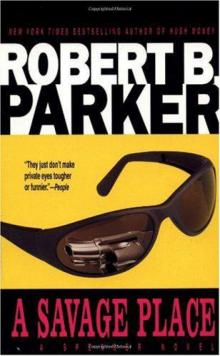 A Savage Place s-8
A Savage Place s-8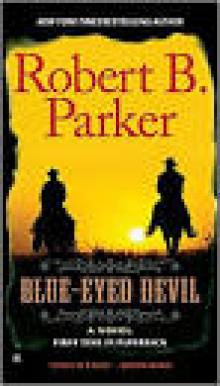 Appaloosa / Resolution / Brimstone / Blue-Eyed Devil
Appaloosa / Resolution / Brimstone / Blue-Eyed Devil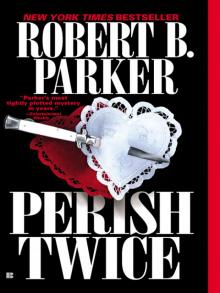 Perish Twice
Perish Twice Spare Change
Spare Change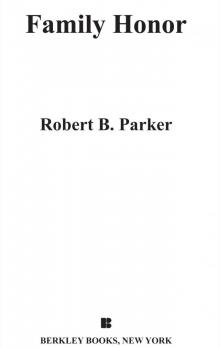 Family Honor
Family Honor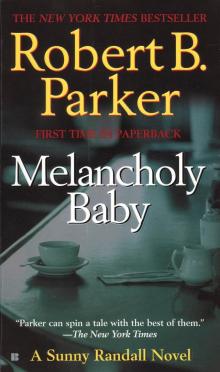 Melancholy Baby
Melancholy Baby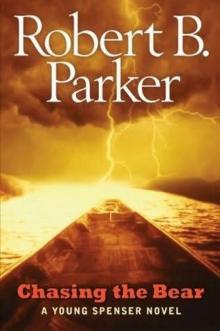 Chasing the Bear
Chasing the Bear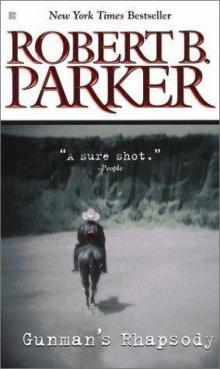 Gunman's Rhapsody
Gunman's Rhapsody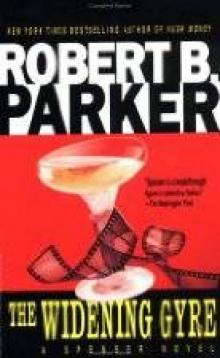 The Widening Gyre
The Widening Gyre Thin Air
Thin Air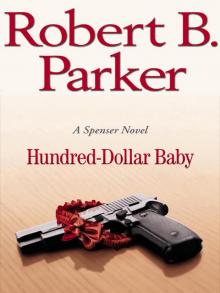 Hundred-Dollar Baby
Hundred-Dollar Baby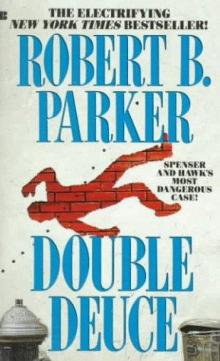 Double Deuce s-19
Double Deuce s-19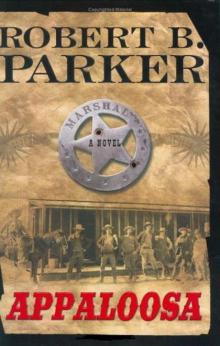 Appaloosa vcaeh-1
Appaloosa vcaeh-1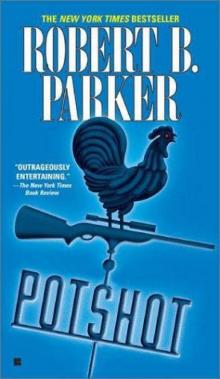 Potshot
Potshot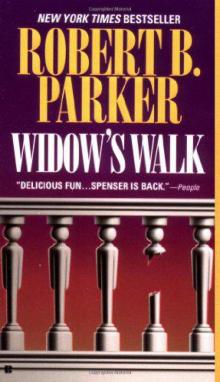 Widow’s Walk s-29
Widow’s Walk s-29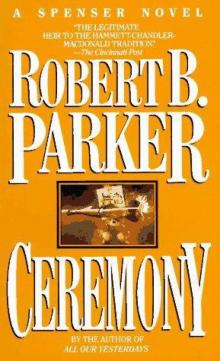 Ceremony s-9
Ceremony s-9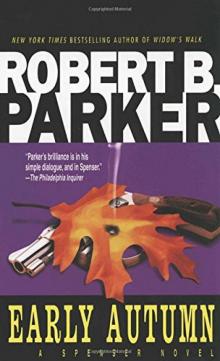 Early Autumn
Early Autumn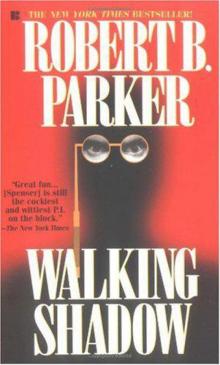 Walking Shadow s-21
Walking Shadow s-21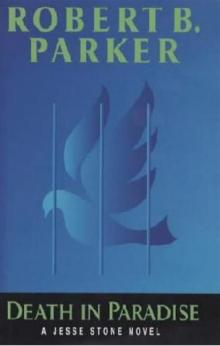 Death In Paradise js-3
Death In Paradise js-3 Shrink Rap
Shrink Rap Blue-Eyed Devil
Blue-Eyed Devil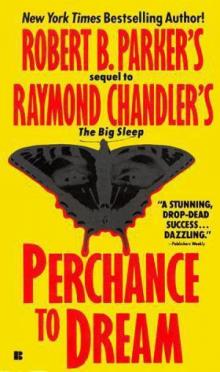 Perchance to Dream
Perchance to Dream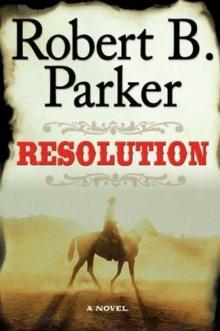 Resolution vcaeh-2
Resolution vcaeh-2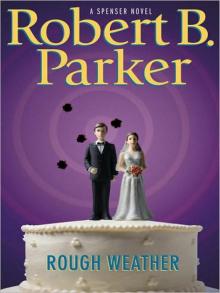 Rough Weather
Rough Weather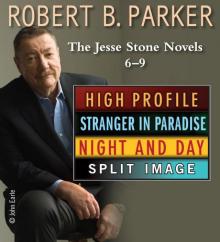 The Jesse Stone Novels 6-9
The Jesse Stone Novels 6-9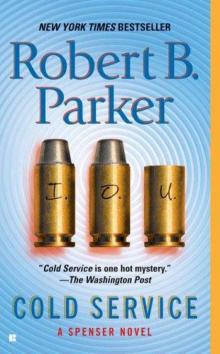 Cold Service s-32
Cold Service s-32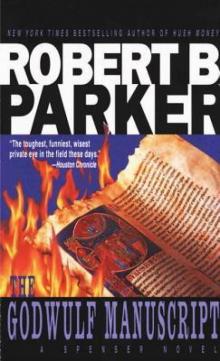 The Godwulf Manuscript
The Godwulf Manuscript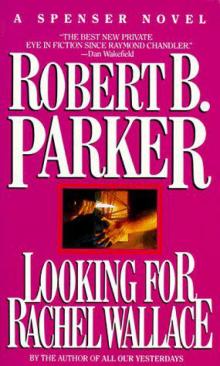 Looking for Rachel Wallace s-6
Looking for Rachel Wallace s-6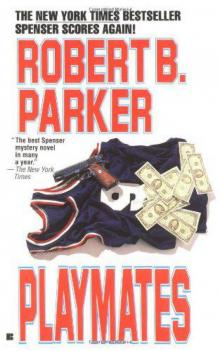 Playmates s-16
Playmates s-16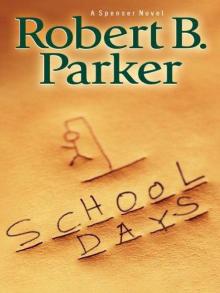 School Days s-33
School Days s-33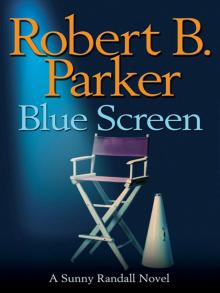 Blue Screen
Blue Screen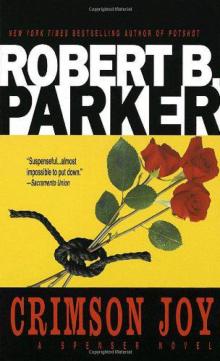 Crimson Joy
Crimson Joy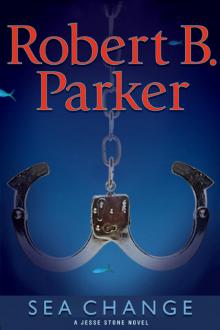 Sea Change js-5
Sea Change js-5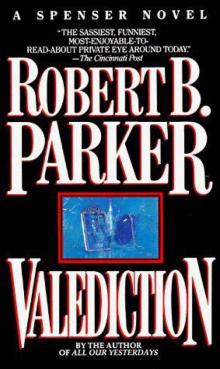 Valediction s-11
Valediction s-11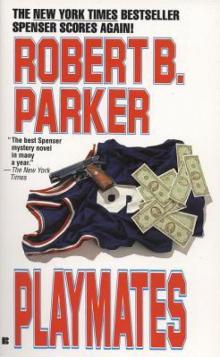 Playmates
Playmates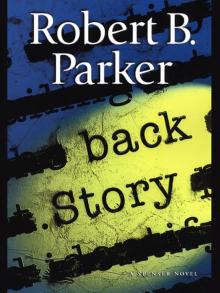 Back Story
Back Story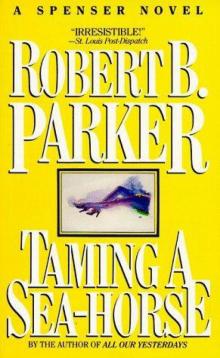 Taming a Sea Horse
Taming a Sea Horse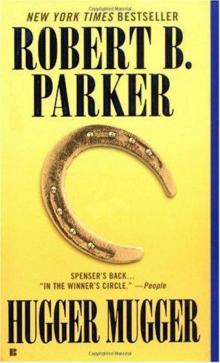 Hugger Mugger
Hugger Mugger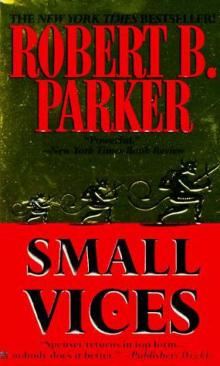 Small Vices s-24
Small Vices s-24 Silent Night: A Spenser Holiday Novel
Silent Night: A Spenser Holiday Novel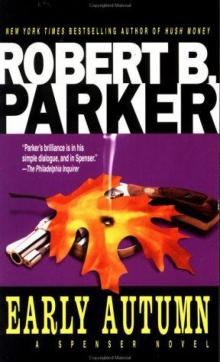 Early Autumn s-7
Early Autumn s-7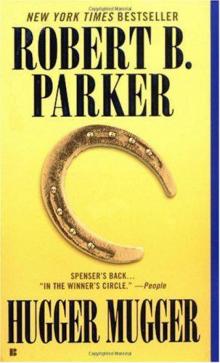 Hugger Mugger s-27
Hugger Mugger s-27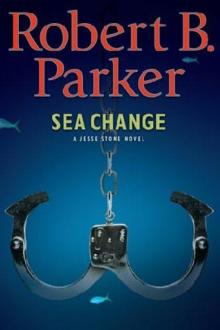 (5/10) Sea Change
(5/10) Sea Change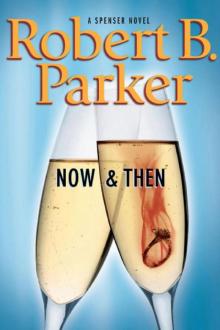 Now and Then
Now and Then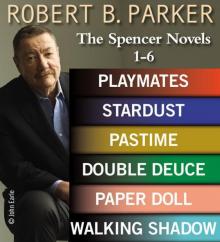 Robert B. Parker: The Spencer Novels 1?6
Robert B. Parker: The Spencer Novels 1?6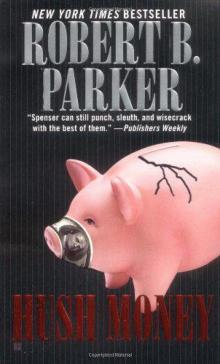 Hush Money s-26
Hush Money s-26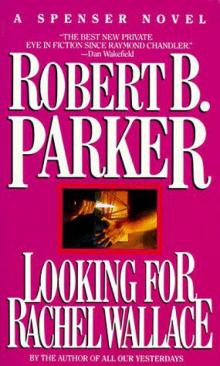 Looking for Rachel Wallace
Looking for Rachel Wallace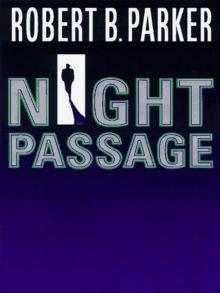 Night Passage
Night Passage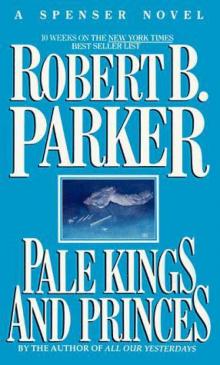 Pale Kings and Princes
Pale Kings and Princes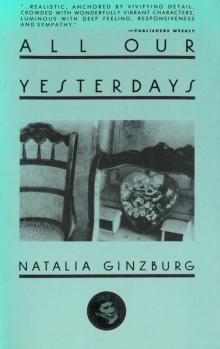 All Our Yesterdays
All Our Yesterdays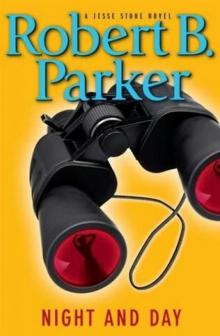 Night and Day js-8
Night and Day js-8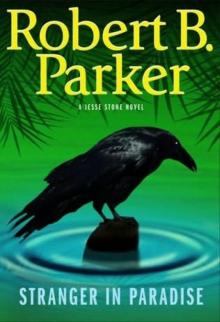 Stranger in Paradise js-7
Stranger in Paradise js-7 Double Play
Double Play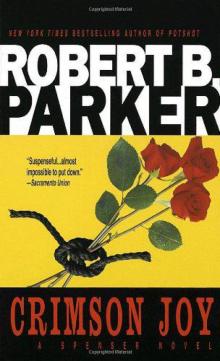 Crimson Joy s-15
Crimson Joy s-15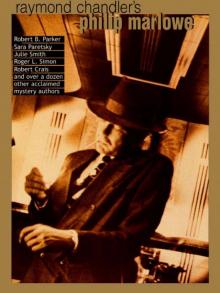 Raymond Chandler's Philip Marlowe
Raymond Chandler's Philip Marlowe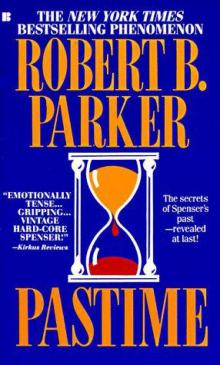 Pastime
Pastime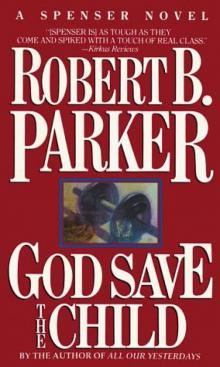 God Save the Child s-2
God Save the Child s-2 Bad Business
Bad Business Trouble in Paradise js-2
Trouble in Paradise js-2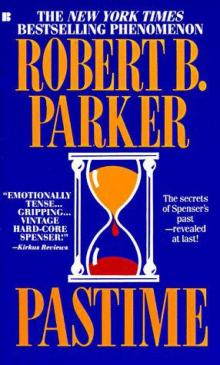 Pastime s-18
Pastime s-18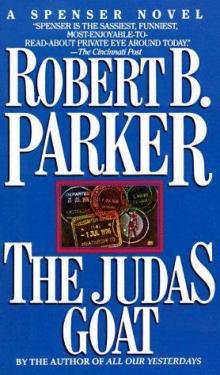 The Judas Goat s-5
The Judas Goat s-5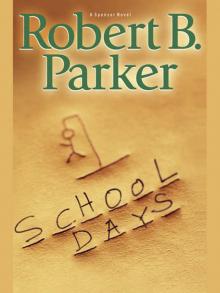 School Days
School Days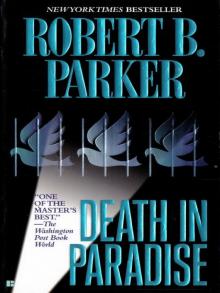 Death In Paradise
Death In Paradise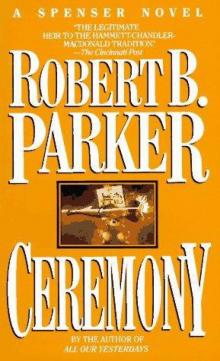 Ceremony
Ceremony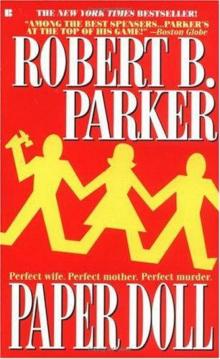 Paper Doll s-20
Paper Doll s-20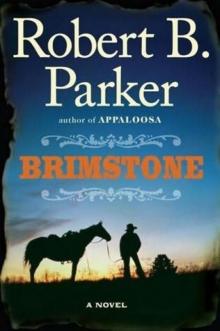 Brimstone vcaeh-3
Brimstone vcaeh-3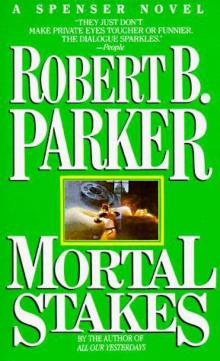 Mortal Stakes s-3
Mortal Stakes s-3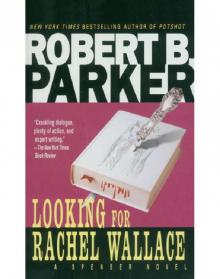 Spencer 06 - Looking for Rachel Wallace
Spencer 06 - Looking for Rachel Wallace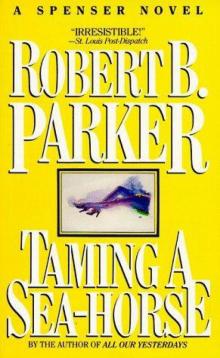 Taming a Sea Horse s-13
Taming a Sea Horse s-13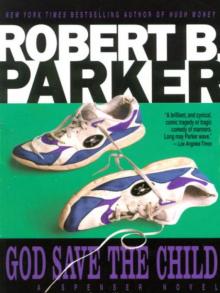 God Save the Child
God Save the Child Chance
Chance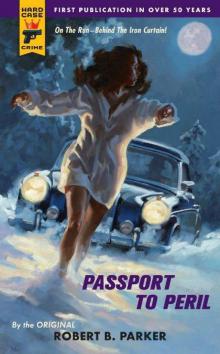 Passport To Peril hcc-57
Passport To Peril hcc-57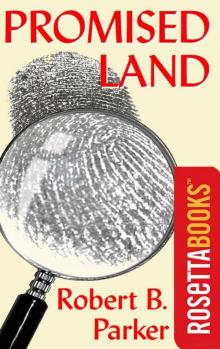 Promised Land
Promised Land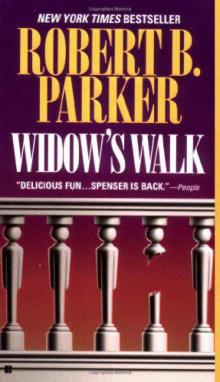 Widow’s Walk
Widow’s Walk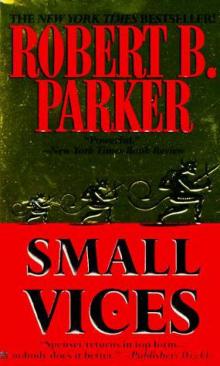 Small Vices
Small Vices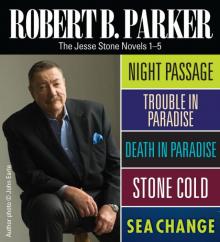 Robert B Parker: The Jesse Stone Novels 1-5
Robert B Parker: The Jesse Stone Novels 1-5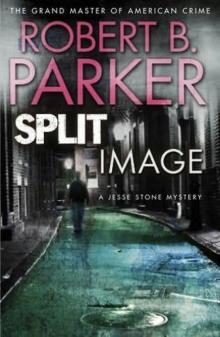 Split Image js-9
Split Image js-9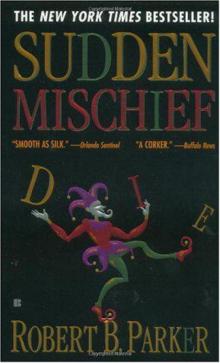 Sudden Mischief s-25
Sudden Mischief s-25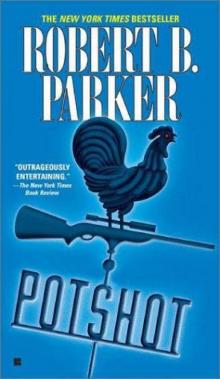 Potshot s-28
Potshot s-28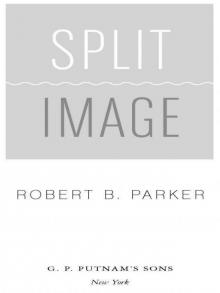 Split Image
Split Image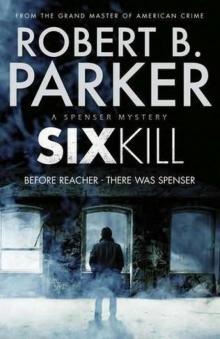 Sixkill s-40
Sixkill s-40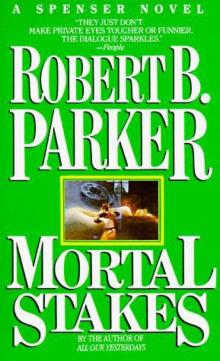 Mortal Stakes
Mortal Stakes Stardust
Stardust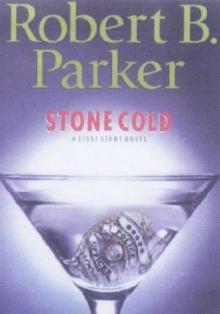 Stone Cold js-4
Stone Cold js-4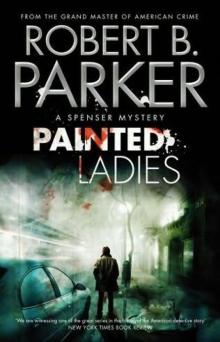 Painted Ladies s-39
Painted Ladies s-39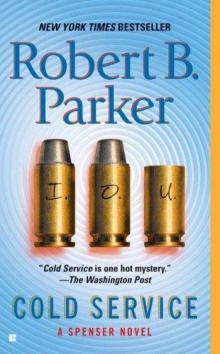 Cold Service
Cold Service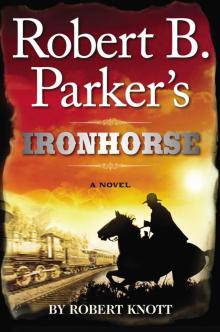 Ironhorse
Ironhorse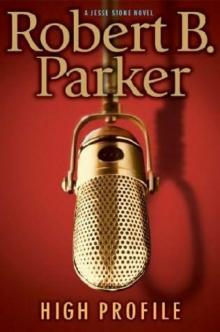 High Profile js-6
High Profile js-6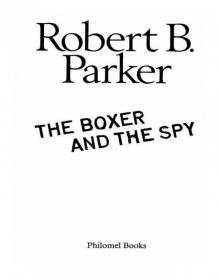 The Boxer and the Spy
The Boxer and the Spy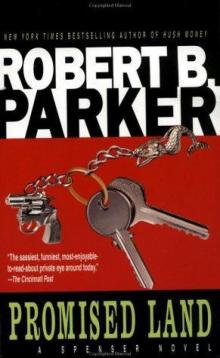 Promised Land s-4
Promised Land s-4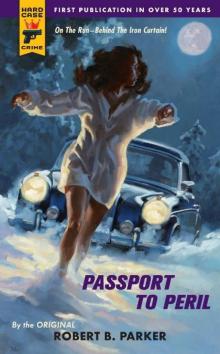 Passport to Peril (Hard Case Crime (Mass Market Paperback))
Passport to Peril (Hard Case Crime (Mass Market Paperback))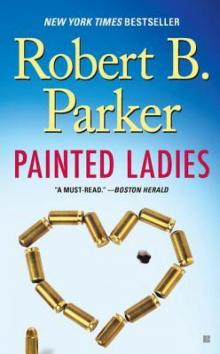 Painted Ladies
Painted Ladies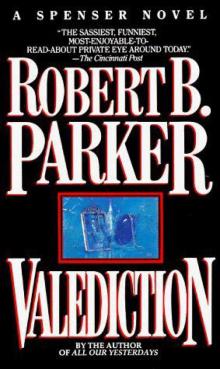 Valediction
Valediction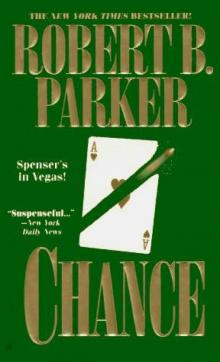 Chance s-23
Chance s-23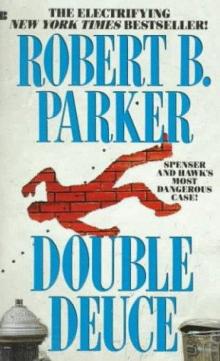 Double Deuce
Double Deuce Wilderness
Wilderness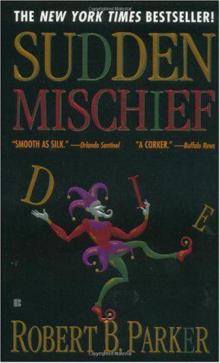 Sudden Mischief
Sudden Mischief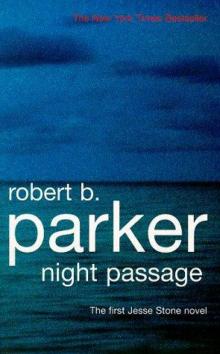 Night Passage js-1
Night Passage js-1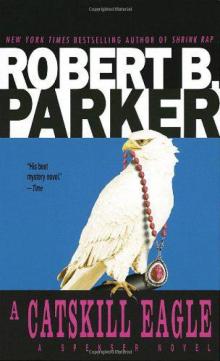 A Catskill Eagle
A Catskill Eagle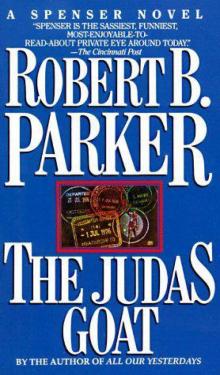 The Judas Goat
The Judas Goat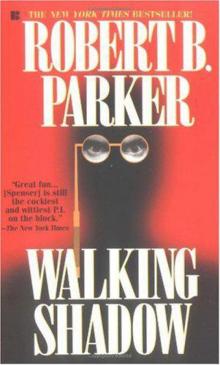 Walking Shadow
Walking Shadow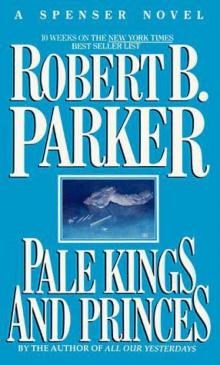 Pale Kings and Princes s-14
Pale Kings and Princes s-14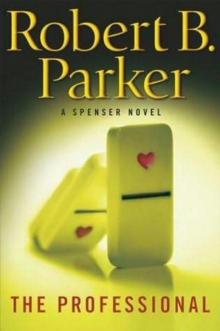 The Professional
The Professional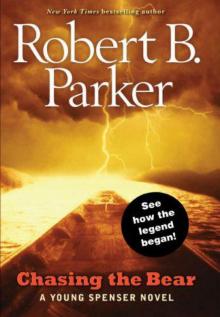 Chasing the Bear s-37
Chasing the Bear s-37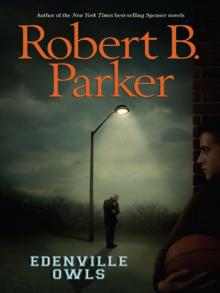 Edenville Owls
Edenville Owls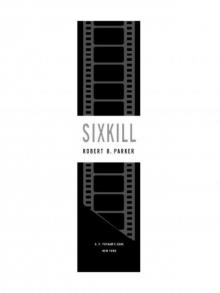 Sixkill
Sixkill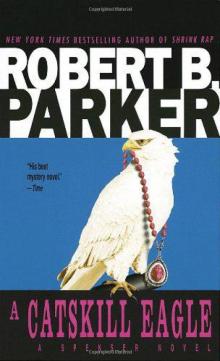 A Catskill Eagle s-12
A Catskill Eagle s-12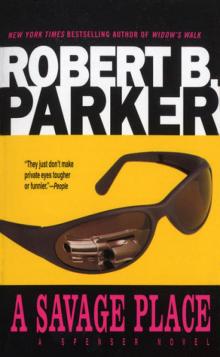 A Savage Place
A Savage Place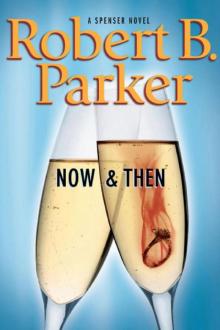 Now and Then s-35
Now and Then s-35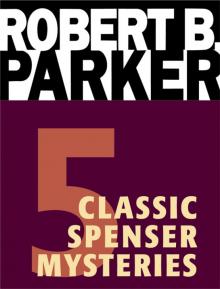 Five Classic Spenser Mysteries
Five Classic Spenser Mysteries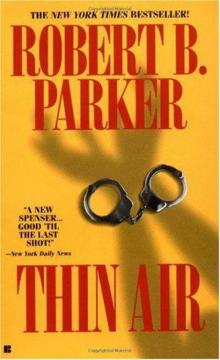 Thin Air s-22
Thin Air s-22